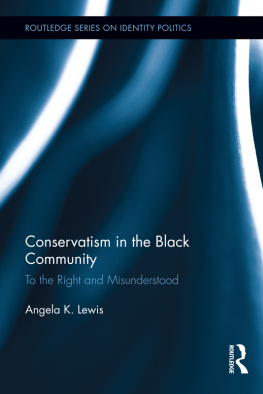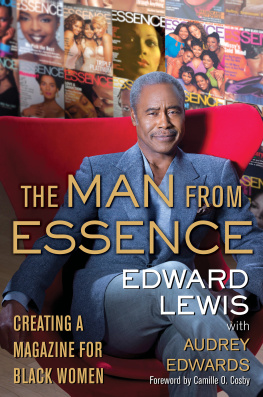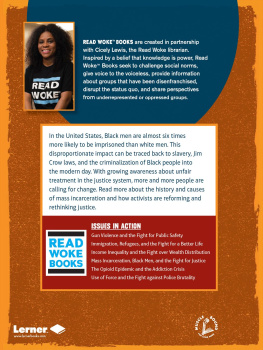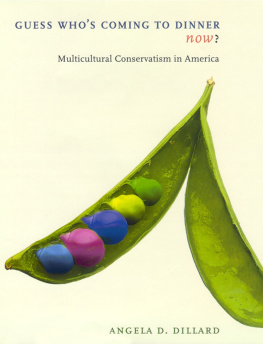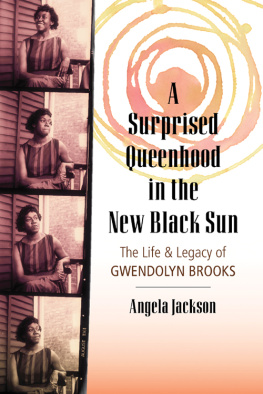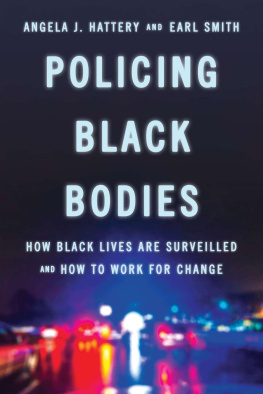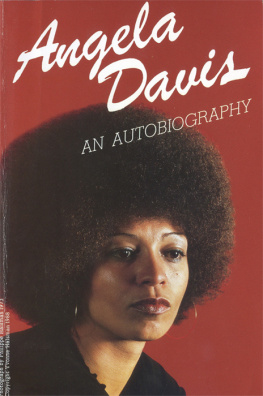Conservatism in the Black Community
Professor Lewis work off ers a detailed and penetrating analysis of African American conservative ideology and how it diff ers from mainstream conservatism. More importantly, she off ers unique and rarely seen insights and findings about how well the Reagan Administration succeeding in altering African American public opinion and ideology. Hence, her new book is a must read and the place to start understanding the micro-level characteristics and features of African American conservatism. There is no peer at the moment.
Hanes Walton Jr., University of Michigan
Conservatism in the Black Community provides answers to some important questions. Why do so many Blacks identity as conservative? Will Blacks increasingly embrace this ideology as they move into the middle-class? And, perhaps most critically, does this represent a potential opportunity for the Republican Party? Lewis addresses these questions and more with balance, creativity, and care. Her results are both intriguing and surprising.
Vincent L. Hutchings, University of Michigan
Conservatism in the Black Community examines the contemporary meanings of Black Conservatism, providing a basis for understanding the impact this phenomenon has on black political behavior. Lewis analyzes conservatism within the black ideological framework, while also explaining the meaning of conservatism in the black community.
While scholars have argued that the level of support for conservatism among blacks is minimal because conservatism is antithetical to black interest, there are a cadre of conservative political intellectuals and political elites in America. Do their views influence those of the wider Black community? Or does the media merely amplify their voices but with little support from the black community? What part of contemporary Black conservatism has found a home in the Tea Party movement?
Focusing on what conservatism means to Blacks in the community and in what issue areas Blacks as a whole tend to have more conservative views, this work neither critiques nor praises Black Conservatism. The results of Lewiss mix of quantitative and qualitative methodologies will be of strong interest to students and scholars of Black politics, Black studies, and political behavior more generally.
Dr. Angela K. Lewis is associate professor of government at the University of Alabama at Birmingham. Her research appears in the National Political Science Review, American Review of Politics, Journal of African American Studies and the International Journal of African Studies. She was also a contributor for Whose Black Politics and The Constitutionalism of American States.
Routledge Series on Identity Politics
SERIES EDITOR: ALVIN B. TILLERY,Jr., Rutgers University
Group identities have been an important part of political life in America since the founding of the republic. For most of this long history, the central challenge for activists, politicians, and scholars concerned with the quality of U.S. democracy was the struggle to bring the treatment of ethnic and racial minorities and women in line with the creedal values spelled out in the nations charters of freedom. We are now several decades from the key moments of the twentieth century when social movements fractured Americas system of ascriptive hierarchy. The gains from these movements have been substantial. Women now move freely in all realms of civil society, hold high elective offi ces, and constitute more than 50 percent of the workforce. Most African-Americans have now attained middle class status, work in integrated job sites, and live in suburbs. Finally, people of color from nations in Latin America, Asia, and the Caribbean now constitute the majority of Americas immigration pool.
In the midst of all of these positive changes, however, glaring inequalities between groups persist. Indeed, ethnic and racial minorities remain far more likely to be undereducated, unemployed, and incarcerated than their counterparts who identify as white. Similarly, both violence and work place discrimination against women remain rampant in U.S. society. The Routledge series on identity politics features works that seek to understand the tension between the great strides our society has made in promoting equality between groups and the residual eff ects of the ascriptive hierarchies in which the old order was rooted.
Some of the core questions that the series will address are: how meaningful are the traditional ethnic, gender, racial, and sexual identities to our understanding of inequality in the present historical moment? Do these identities remain important bases for group mobilization in American politics? To what extent can we expect the state to continue to work for a more level playing field among groups?
Black Politics Today
The Era of Socioeconomic Transition
Theodore J. Davis Jr.
Jim Crow Citizenship
Liberalism and the Southern Defense of Racial Hierarchy
Marek Steedman
The Politics of Race in Latino Communities
Walking the Color Line
Atiya Kai Stokes-Brown
Conservatism in the Black Community
To the Right and Misunderstood
Angela K. Lewis
First published 2013
by Routledge
711 Third Avenue, New York, NY 10017
Simultaneously published in the UK
by Routledge
2 Park Square, Milton Park, Abingdon, Oxon OX14 4RN
Routledge is an imprint of the Taylor & Francis Group, an informa business
2013 Angela K. Lewis
The right of Angela K. Lewis to be identified as author of this work has been asserted by her in accordance with sections 77 and 78 of the Copyright, Designs and Patents Act 1988.
All rights reserved. No part of this book may be reprinted or reproduced or utilised in any form or by any electronic, mechanical, or other means, now known or hereafter invented, including photocopying and recording, or in any information storage or retrieval system, without permission in writing from the publishers.
Trademark Notice: Product or corporate names may be trademarks or registered trademarks, and are used only for identification and explanation without intent to infringe.
Library of Congress Cataloging-in-Publication Data
Lewis, Angela K.
Conservatism in the Black community : to the right and misunderstood / by Angela K. Lewis.
p. cm. (Routledge series on identity politics)
Includes bibliographical references and index.
1. African AmericansPolitics and government. 2. ConservatismUnited States. I. Title.
E185.L46 2012
323.1196073dc23
2012031000
ISBN13: 978-0-415-53550-2 (hbk)
ISBN13: 978-0-203-11253-2 (ebk)
Acknowledgments
This manuscript has developed over many years. What first started out as an idea in a voting-behavior class in graduate school, then a paper and a dissertation, has now evolved into a manuscript. During the course of developing this manuscript into a finished project, I owe a great deal to many individuals. First and foremost, I thank God for giving me the skills and patience to undertake this project. I am deeply grateful for a number of people who made this project possible. First, I would like to thank Michael Kerns, editor at Routledge Press. His faith in the project was evident from the very beginning. He quickly facilitated reviews and the ultimate publication of this book. I am also thankful to Alvin Tillery, the series editor at Routledge, for his professional expertise in improving the manuscript and his unwavering support for the project. Without both of them, this project would not have been complete. I also thank the University of Alabama at Birmingham, the Office of Equity and Diversity, the College of Arts and Sciences, the UAB ADVANCE program, and the Department of Government for financial support for this project. I especially thank Dr. Louis Dale for the Comprehensive Minority Faculty Development grant and his executive assistant Denise Joseph for continued professional and financial support for this project. It was his office that provided the funds to get this project started. His office also provided the funds to expand this project. I also owe a tremendous thanks to my department chair, Wendy Gunther-Canada, who was especially supportive and found financial support for the project. I also thank my colleagues in the department who were instrumental in providing professional support. Thanks, Holly, for always asking when I would be done with the manuscript and that impromptu assistance. I also thank the National Council for Black Studies for being open and receptive to my work. It was my participation at this annual meeting that allowed me to formulate my ideas for this manuscript. James Judd Beason at the Georgia Survey Research Center and Debra McCallum at the Institute for Social Science Research at the University of Alabama assisted in data collection. Jannie Williamson, Kevin Johnson, Lorraine Smith, and Dawn Grill provided administrative support when needed. I also thank my mentors Anthony Nownes, John Scheb, and Dwight Aarons, who assisted in the very beginning stages.


